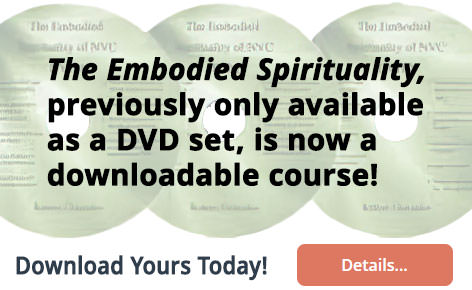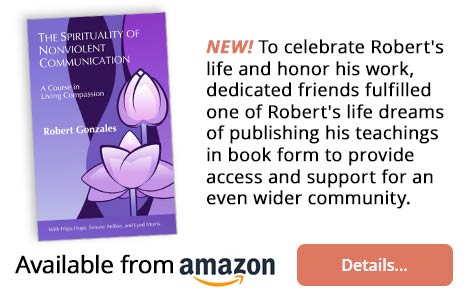

Welcome to the Robert Gonzales Training Legacy. Here you can learn more about Robert and the powerful teachings he dedicated his life to. NVC Academy is proud to house and share with you the complete body of his life's work. We invite you to explore, learn, and help keep his legacy alive!
Robert's passion was in the spirituality of the Nonviolent Communication (NVC) process. He saw NVC both as a process that helps people connect more authentically with themselves and others, and as a spiritual practice and way of living. The worldwide NVC community mourned when Robert died in 2021. He left behind a legacy of work that emerged from a lifetime of inquiry into the intersection between spirituality and human communication. More about Robert.
Trainer Tip
1 - 2 minutes
Trainer Tip: We often find ourselves slipping into old behaviors that we would rather change. This is because we don’t have a new plan for responding to the same old situations. In that case, notice whether you are slipping into old behaviors today. Connect to your unmet needs and then identify a new strategy for the situation.
Details...Audio
6 - 8 hours
Do you sometimes feel overwhelmed – or locked into passivity? This course offers you a way out. Learn to change the way you perceive leadership, and you’ll help yourself respond more powerfully and proactively every day of your life – wherever you are – and whomever you’re with!
Details...Audio
4 - 6 hours
Most of us believe we are powerless at work – even if we’re the one “in charge.” This course offers you the opportunity to learn how to consciously change this mindset, and have a positive impact on workplace culture and attitudes along the way. Most of us believe we are powerless at work – even if we’re the one “in charge.” This course offers you the opportunity to learn how to consciously change this mindset, and have a positive impact on workplace culture and attitudes along the way.
Details...Trainer Tip
1 - 2 minutes
Trainer Tip: One of the basic philosophies of Nonviolent Communication is valuing everyone’s needs equally. That means that you consider your needs to be equal to another person’s needs. If someone asks you for empathy, and you choose to empathize at you own expense, you're not living in a Nonviolent Communication consciousness. Be aware of your own needs today when someone asks you to be their emotional support.
Details...Article
4 - 6 minutes
A challenge is an expansion of making a clear, positive doable request — and, when given, the person feels deeply seen by the challenger. A challenge isn't just about getting someone to take action on something important to them; it's a fierce form of empathy that supports people in connecting with their life force, and integrates it into their lives with action. A real challenge is tied to the receiver's goals, passions and dreams -- and expands their potential.
Details...Article
3-4 minutes
Shared vulnerability can build more intimacy, mutuality, being seen and heard, empathy, or community. Inviting shared vulnerability means earning another’s trust that you can consistently offer attentive, curious, and compassionate listening. Here are four strategies to invite shared vulnerability.
Details...Trainer Tip
1 - 2 minutes
Trainer Tip: To reduce defensiveness and hurt feelings when talking to your partner about your sexual needs that haven't been met, keep the conversation focused on your needs, not her lack of skill, and make a very specific request. From there, you can both explore any shared needs, blocks, or support needed to bring you both closer to your needs.
Details...Article
2 - 3 minutes
If we are in the dominant group, intervening to prevent violence or an "ouch" is a way to ally with marginalized folks. We can intervene to meet their needs, rather than our own. In other words, we can intervene without putting our experience at center stage. To that end, here are six ways to ask if an intervention is welcome.
Details...Article
2-3 minutes
Misunderstandings can be painful. We can easily avoid this by checking what the other person understood from what we said, and ask the other person to do the same. Doing this is especially important when it comes to planning, shared decision-making, and when emotions are strong. Also, the more someone knows you, the more they think they already know what you mean -- which can get in the way of really hearing you. Here are a variety of ways to approach this simple strategy.
Details...Trainer Tip
1 - 2 minutes
Trainer Tip: Find your deepest need. Then notice when you do things, or have done things, that keep you from meeting your most important need. And then take conscious action that is in alignment with the need you want to meet.
Details...

